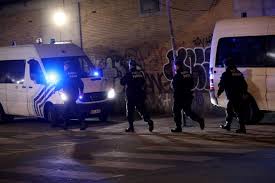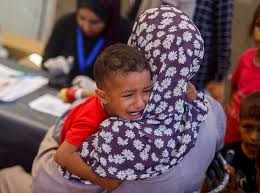NEW YORK (TASS): The growing hostility between states in the international arena has led to the fact that the risk of the use of nuclear weapons has reached an unacceptable level. This was stated on Monday by the UN Deputy Secretary General, High Representative for Disarmament Issues Izumi Nakamitsu at a meeting of the first committee of the 76th session of the UN General Assembly on Disarmament Issues.
“The growing hostility between the nuclear powers has raised nuclear risks to levels that are unacceptable,” she said.
Nakamitsu noted that not only nuclear, but also conventional weapons, which also continue to be accumulated by states, pose a threat to the world. She clarified that global military spending totaled nearly $ 2 trillion in 2020, up 2.6% from 2019.
Nakamitsu said that Russia and the United States need to start a dialogue in advance on a new arms control agreement before the expiration of the Treaty on Measures for the Further Reduction and Limitation of Strategic Offensive Arms (START, unofficially known as START-3) in 2026.
“I am encouraged by the positive development [of relations] between the two largest nuclear countries – the United States and Russia, including the extension of the START Treaty, as well as the reaffirmation [at the Geneva meeting] by Presidents Joe Biden and Vladimir Putin of the principle that a nuclear war cannot be won and should never be unleashed, “Nakamitsu said at the First Committee of the UN General Assembly.
“Returning to regular strategic dialogue, I hope that negotiations between the United States and Russia on new arms control agreements will begin long before the expiration of the START Treaty in 2026,” she said.
Russia and the United States signed START in 2010. On February 3, 2021, the Russian Foreign Ministry exchanged notes with the US Embassy on the completion of the internal procedures necessary for the entry into force of the agreement on the extension of the agreement for five years.
War crimes likely committed in Libya since 2016: War crimes and crimes against humanity have likely been committed in Libya by all parties to conflict since 2016 including by external actors, a Human Rights Council-appointed probe said on Monday.
From arbitrary detention to torture, the recruitment of child soldiers and mass killings, the Independent Fact-Finding Mission on Libya listed numerous grave rights violations which had impacted the country’s people and which gave them “reasonable grounds” for the war crimes allegations. Civilians were particularly at risk during the 2019-2020 fight for the capital Tripoli, the Mission said, as well as during other violence in the country since 2016, which has been marked by attacks on hospitals, schools, migration detention centres, and communities at large.
“Airstrikes have killed dozens of families. The destruction of health-related facilities has impacted access to healthcare, and anti-personnel mines left by mercenaries in residential areas have killed and maimed civilians,” said Mission chair, Mohamed Auajjar.
The investigators – whose Fact-Finding Mission was created by the Human Rights Council in June last year – published their findings after reviewing hundreds of documents and interviewing more than 150 individuals, alongside parallel research in Libya, Tunisia and Italy.
“Arbitrary detention in secret prisons and unbearable conditions of detention are widely used by the State or militias against anyone perceived to be a threat to their interests or views,” said the Mission’s Tracy Robinson speaking to journalists in Geneva. “Violence in Libyan prisons is committed on such a scale and with such a level of organisation that it may also amount to crimes against humanity.”
The UN-appointed independent investigators highlighted violence against migrants, refugees and other vulnerable minorities including LGBTQi individuals.
“Violations against migrants are committed on a widespread scale by State and non-State actors with a high level of organisation and with encouragement of the State. All of this is suggestive of crimes against humanity,” said Mission member Chaloka Beyani.
Mr. Beyani also pointed to worrying reports about the continued presence of foreign fighters in the country from the Syrian conflict and private mercenaries allegedly contracted by the Russia-based Wagner Group, in the fight for the Libyan capital from 2019 to 2020, claims highlighted previously by the UN Working Group on the use of mercenaries.
“Our investigations have indicated that there are foreign fighters, there are mercenaries in Libya, and they have not yet left the territory of Libya as required,” he said. Other likely violations of international law covered by the Mission included the recruitment of children to fight.
“Our report also documents the recruitment and direct participation of children in hostilities, the enforced disappearance and extrajudicial killings of prominent women and continuing sexual and other forms of violence against vulnerable populations including LGBTQI persons,” said Ms. Robinson.
The Mission also verified allegations of atrocity crimes committed in the town of Tarhuna, southeast of Tripoli, between 2016 and 2020, where mass graves containing the bodies of men, women and children have been found. According to reports, the Kaniyat militia were responsible for killing perhaps hundreds of civilians in Tarhuna, their wounds indicating that they had been shot many times while blindfolded, handcuffed and with their legs tied.
Mission chair Mohamed Auajjar noted that the recently installed Government of National Unity has created the possibility of national dialogue and unification of State institutions. The UN has been supporting peace efforts in Libya, which descended into chaos and conflict following the overthrow of President Muammar Gaddafi in 2011, resulting in the country being divided between the internationally recognized Government of National Accord (GNA) and the rival Libyan National Army (LNA) based in the east.






